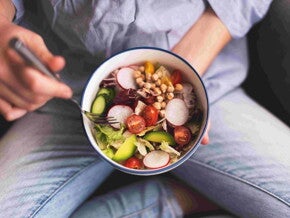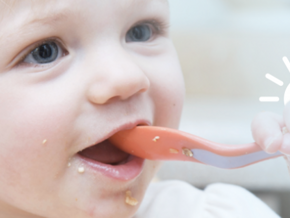
As you probably already know, toddlers are incredibly active and energetic! For their body size, toddlers need to make every bite count with nutritious meals and snacks.
In order for toddlers to get the nutrients they need for growth and development, meals should provide essential nutrients in a small portion and be served frequently throughout the day - typically three balanced meals and two or three nutritious in-between snacks during the day.
Your 12 month old needs foods from each food group every day. Below are suggested servings for each food group.
| Food groups | Recommended serves per day* | Serve size | Serving size example |
|---|---|---|---|
| Dairy | 1-1.5 | 250mL milk equivalent | 1 cup full cream cow’s milk 2 slices of hard cheese 200g full fat yoghurt |
| Grains and cereals | 4 | 40g bread equivalent | 1 slice whole grain bread ½ cup cooked pasta, rice or noodles ¾ cup (30g) wheat based cereals ¼ cup (30g) muesli |
| Vegetables and legumes/beans | 2-3 | 75g | 1/2 cup cooked vegetables 1 cup salad vegetables ½ medium potato 1 medium tomato ½ cup cooked or canned beans |
| Fruit | 1/2 | 150g | 1 medium banana, pear or apple 2 small kiwi fruits or apricots 1 cup canned fruit |
| Meat/poultry/fish/eggs | 1 | 65g | 65g cooked red meat 80g chicken or turkey 2 eggs 100g cooked fish fillet |
* Your toddler's needs may be greater or less than these stated; always follow your child's hunger and fullness cues
Laying a healthy foundation
These tips can help you teach your toddler good eating habits that will stick with her for a lifetime:
1. Mix it up. A balanced diet depends on a variety of foods from every food group every day—whole grains, fruit, vegetables, meat and beans and dairy. Also be sure to include foods with nutrients that your child may be lacking: Iron, Zinc, Iodine, Vitamin D, and fibre.
2. Serve a rainbow of fruits and veggies. A variety of colourful foods expands your child’s tastes and provides a variety of nutrients for her tummy. Introducing new foods with old favourites may improve acceptance. For example, if she likes corn, try adding small red capsicum dices.
3. Let your child decide how much to eat. Teach your child to respect her appetite by letting her decide what and how much to eat. If she’s hungry, let her eat heartily. But if she’s full, let her stop.
4. Snack smart. Serve three small meals and two to three snacks a day. Because some toddlers get 25% of their kilojoules from snacks, make sure to offer nutritious choices for every snack. Avoid high-energy, low-nutrient foods, like chips, cookies and sugary drinks.
5. Drink responsibly. Beverages are important for hydration, but too many of them can make your toddler too full to eat. Your toddler’s beverage choices should include water and pasteurized full cream cow’s milk. Limit milk to 2 cups per day. Avoid fruit juice and other sweetened drinks.
6. Offer healthy fats. Young children need energy from fat for growth. Incorporate healthy sources of predominantly unsaturated fat – fatty fish, avocados, food made with vegetable oils – into your toddlers diet.
7. Avoid adding salt. Even if you think your child’s food tastes too bland, remember that she doesn’t need all the salt that tastes right to you. Sodium also becomes a preferred taste once it’s introduced.
Filling a toddler’s nutrition gaps
It’s important to understand toddlers’ eating habits and nutrient intakes. These are some common nutrition gaps that may appear in toddlers.
Fruits and vegetables contain essential vitamins, minerals and fibre. A diet high in fruits and veggies is important for healthy growth and development.
How to get it: Offer your toddler ½ serve of fruit and 2-3 serves of vegetables every day. Fruit and vegetable servings can be from fresh, frozen or pureed canned foods, but need to be cut up into small, easy-to-eat pieces. Remember you can still serve purees in toddler-favourite foods to add variety.
Sweetened beverages and desserts. There’s not a lot of room in your toddler’s diet for foods that provide energy but not many nutrients. Desserts, sweets and sweetened beverages can be high in kilojoules compared to the micronutrients they provide, and can displace other nutritious foods in the diet.
How to get it: In place of sweets, serve your toddler more nutritious options such as fruits, yoghurt and cereals and snacks that are made with whole grains.
Fibre plays a big role in your child’s digestive health. An adequate intake for toddlers is 14 grams per day.
How to get it: Every day offer whole grains, and fresh, frozen, pureed or canned fruits and vegetables that are the right size and texture for your child.
Vitamin E is an important antioxidant that helps protect the cells in the body from damage.
How to get it: Foods that have Vitamin E include vegetable oils (canola, corn, soybean), avocados, whole grains and some leafy green vegetables (spinach, broccoli).
Potassium is a mineral that helps muscles work properly.
How to get it: Potassium is found in many foods, including potatoes, sweet potatoes, avocado, spinach, yogurt, bananas and citrus fruits.
Healthy fats contain important kilojoules for growth. Fat also helps the body use vitamins, such as Vitamins A, D, E and K. A toddler’s diet should include about 20 to 35% of total energy intake from fat, preferably mono- and polyunsaturated fats like those found in fish, avocados, and foods made with vegetable oils, such as canola and soybean oil. These healthy fats should replace the saturated fats found in high-fat dairy products such as butter, cheese and fatty meats such as hot dogs, bacon and sausages.
How to get it: Try preparing foods with fat like soy or canola oil, that also have the Omega-3 fat, alpha-linolenic acid, or offer condiments such as mayonnaise or salad dressings made with these oils. Remember to limit foods high in saturated and trans fats.




















